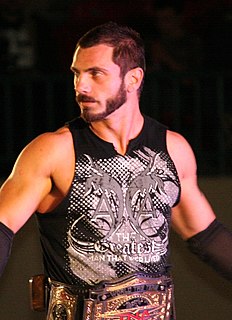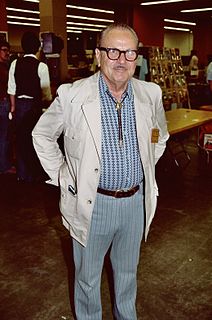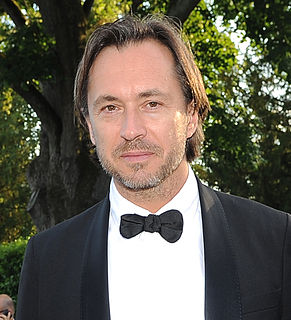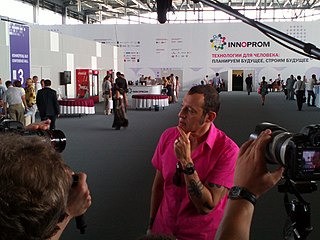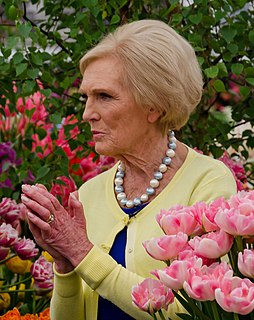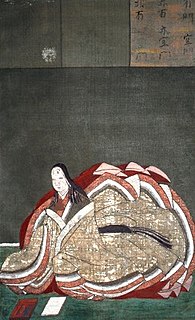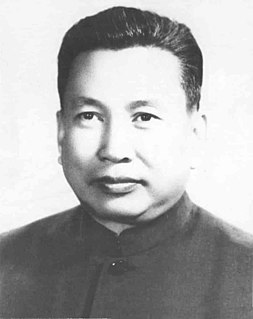A Quote by Mark Frauenfelder
The maker movement is about people who want to gain more control of the human design world that they interact with every day. Instead of accepting off-the-shelf solutions from institutions and corporations, makers would like to make, modify, and repair their own tools, clothing, food, toys, furniture, and other physical objects.
Related Quotes
Being a sculptor who uses found objects, all the objects I use in my work have been designed by other people. So I'm tweaking them in some way by squashing them or throwing them off cliffs! Then I formalise my damage by suspending them or arranging them in some kind of way. So I'm using other people's design in a way, so I'm an 'un-maker.'
If there's a group like Amish people, that want to live their own lifestyle – they don't want to live in our city – they want to live out in the country, with their own projects. We’ll put up the buildings for them, design the buildings for them, design the food production systems for them – if they want us to. But we don’t control them.
My father would sit and design furniture and cabinets - he was a carpenter and cabinet maker - and I would ask for my own piece of paper and pencil. And when I would say, 'What should I draw?' he would push a cartoon under my nose and say, 'Here, draw this.' So the cartoon became a kind of focus of attention.
There are new ways of producing food, film, clothing, and research that steer clear of using animals. Some of those products are functionally equivalent or even superior to what we're used to. Now corporations, legislatures, and other institutions are responding, and supporting these shifts, so we're seeing seismic changes throughout society.
I do feel that the world is entering into a period of the incredible period of reflection and introspection. A lot of people are questioning the future, and I can't help but think that's a positive thing. I'm not sure about the art world, but the design world may be able to offer some solutions. Design is about troubleshooting. As a designer, I ultimately feel like a gun for hire. Companies hire me because they've got a problem. That's kind of what it boils down to. And I think this is a moment in our history where we need different solutions.
Because we're becoming such an urban nation, we're going to need to be producing so much more food in cities. These institutions have members, obviously. They have the resources to start projects like urban farms and gardens, teaching tools, and the ability to educate their members so that they can then go home and start their own urban gardens. I just really think that faith-based institutions can take the lead in creating community-based food systems, and I'd really like to see that happen.
There's always a possibility of richer maturation - of taking more and more responsibility for yourself and for your life...And this is what I hope...to make you understand how much you gain by taking re-sponsibility for every emotion, every movement you make, every thought you have...We touch each other by honestly being what we are, not intentionally making contact.
When you look at the Koch brothers, who make three million dollars an hour on their dividends alone, you begin to get a sense of what we're talking about. The estimates now are that the upper 1% control something like 40% of all wealth. Eighty families in the world control as much as half the world's population. These figures are being produced every day. We need to put a human face to these figures. We need to make clear that something is being taken from the vast majority of people, and is causing an enormous amount of suffering.
I've been amazed by the success of 'The Great British Bake Off.' I've been 'rediscovered' at the age of 76. When I was asked to be a judge, I said I wanted to be myself. I didn't want to shout like some other television judges. I also said I was a very bad bread maker, so would the programme makers find someone to help on the bread scene?
The wood-carver can fashion whatever he will. Yet his products are but toys of the moment, to be glanced at in jest, not fashioned according to any precept or law. When times change, the carver too will change his style and make new trifles to hit the fancy of the passing day. But there is another kind of artist, who sets more soberly about his work, striving to give real beauty to the things which men actually use and to give to them the shape which tradition has ordained. This maker of real things must not for a moment be confused with the maker of idle toys.



